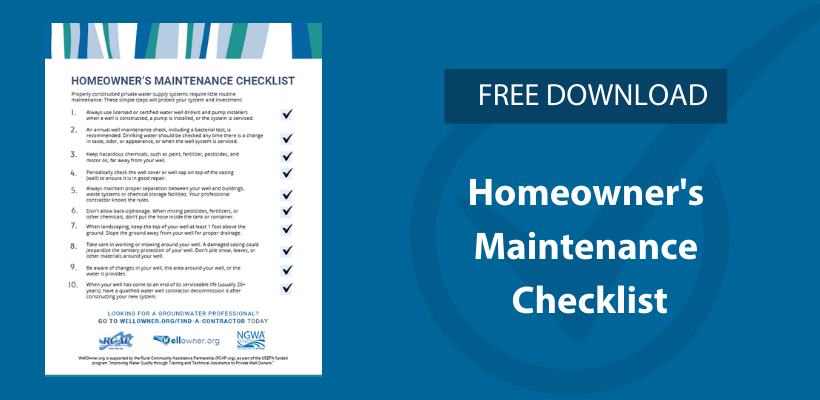Regular water well system maintenance is important. Knowing and practicing the basics of regular well maintenance can reduce risks to your water supply and prevent costly and inconvenient breakdowns.
Properly constructed private water supply systems require little routine maintenance. These simple steps will help protect your system and investment:
- Always use licensed or certified water well drillers and pump installers when a well is constructed, a pump is installed, or the system is serviced.
- An annual well maintenance check, including a bacterial test, is recommended. Drinking water should be checked any time there is a change in taste, odor or appearance, or when the well system is serviced.
- Keep hazardous chemicals, such as paint, fertilizer, pesticides, and motor oil far away from your well.
- Periodically check the well cover or well cap on top of the casing (well) to ensure it is in good repair.
- Always maintain proper separation between your well and buildings, waste systems or chemical storage facilities. Your professional contractor knows the rules.
- Don’t allow back-siphonage. When mixing pesticides, fertilizers, or other chemicals, don’t put the hose inside the tank or container.
- When landscaping, keep the top of your well at least one foot above the ground. Slope the ground away from your well for proper drainage.
- Take care in working or mowing around your well. A damaged casing could jeopardize the sanitary protection of your well. Don’t pile snow, leaves, or other materials around your well.
- Keep your well records in a safe place. These include the construction report, as well as annual water well system maintenance and water testing results.
- Be aware of changes in your well, the area around your well, or the water it provides.
- When your well has come to the end of its serviceable life (usually 20+ years), have a qualified water well contractor decommission it after constructing your new system.
Click here to preview and download this checklist (pdf).
Click here to learn more about water well maintenance, such as well disinfection, working with contractors, what to do with old, unused wells, what to expect during an annual inspection, and more.
Ready to call a licensed or certified water well driller in your area? Go to our “Find a Contractor” tool to find a trusted expert close to you.



